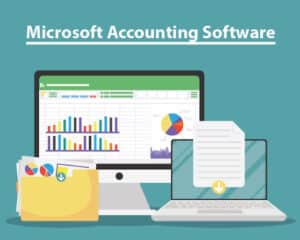news.metroandalas.co.id | Microsoft Accounting Software – Microsoft offers various accounting software solutions to cater to the financial needs of businesses, ranging from small startups to large enterprises. Two popular accounting software offerings from Microsoft are:

Microsoft Dynamics 365 Business Central:
This is a comprehensive business management solution designed for small and medium-sized businesses. It combines accounting, finance, sales, customer service, and operations into a single integrated platform. Microsoft Dynamics 365 Business Central offers features such as general ledger, accounts payable and receivable, inventory management, financial reporting, and more. It provides real-time insights and is customizable to suit specific industry requirements.
Microsoft Excel:
While not a dedicated accounting software, Microsoft Excel is a versatile spreadsheet program widely used for financial and accounting purposes. Many businesses, especially smaller ones, use Excel for tasks like creating budgets, tracking expenses, managing accounts, and generating financial reports. Excel offers various financial functions and templates to assist with accounting tasks.
These Microsoft accounting solutions are part of a broader suite of business software and tools that can help organizations manage their finances, streamline operations, and make data-driven decisions. The choice between these options depends on the size and complexity of the business, as well as specific accounting needs and preferences. Additionally, Microsoft frequently updates and enhances its software offerings, so it’s essential to explore the latest features and versions when considering accounting solutions.
Microsoft Accounting Software Functions
Microsoft accounting software, such as Microsoft Dynamics 365 Business Central, is a robust financial management system that offers a wide range of functions to help businesses manage their accounting and financial operations efficiently. Here are the key functions and features typically found in Microsoft accounting :
General Ledger Management:
- Maintain a central ledger to record all financial transactions.
- Track income, expenses, assets, and liabilities.
- Create and manage chart of accounts.
Accounts Payable (AP) Management:
- Record and track supplier invoices and payments.
- Manage vendor information and payment terms.
- Automate approval workflows for invoice processing.
Accounts Receivable (AR) Management:
- Create and send customer invoices.
- Track customer payments and outstanding balances.
- Manage customer credit limits and terms.
Bank Reconciliation:
- Reconcile bank statements with accounting records.
- Identify discrepancies and reconcile adjustments.
Inventory Management:
- Track and manage inventory levels.
- Monitor stock movements and reorder points.
- Calculate cost of goods sold (COGS).
Financial Reporting and Analysis:
- Generate financial statements such as income statements, balance sheets, and cash flow statements.
- Create customized reports and dashboards.
- Perform financial analysis with real-time data.
Budgeting and Forecasting:
- Create and manage budgets for different departments or projects.
- Compare actual financial performance against budgeted figures.
- Forecast future financial scenarios based on historical data.
Fixed Asset Management:
- Track and depreciate fixed assets over time.
- Manage asset acquisition and disposal.
- Ensure compliance with accounting standards.
Multi-Currency Support:
- Conduct transactions in multiple currencies.
- Manage exchange rates and currency conversions.
Tax Compliance:
- Calculate and manage taxes, including sales tax and VAT.
- Generate tax reports for regulatory compliance.
Security and Access Control:
- Implement user roles and permissions to restrict access to sensitive financial data.
- Maintain data security and audit trails.
Integration with Other Systems:
- Seamlessly integrate with other Microsoft applications, such as Microsoft Office Suite and Microsoft Power BI, for data analysis and reporting.
Workflow Automation:
- Automate financial processes like invoice approval and payment processing.
- Improve efficiency and reduce manual tasks.
Scalability:
- Scale the software to meet the growing needs of the business.
Cloud-Based Access:
Access financial data and perform tasks from anywhere with an internet connection using cloud-based versions of Microsoft accounting software.
These functions collectively empower businesses to maintain accurate financial records, make informed decisions, comply with accounting regulations, and optimize their financial performance. Microsoft Accounting Software is designed to be user-friendly and adaptable to the specific needs of different industries and organizations.